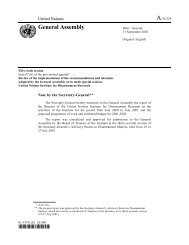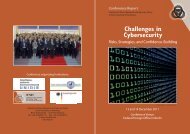Security in Space The Next Generation - UNIDIR
Security in Space The Next Generation - UNIDIR
Security in Space The Next Generation - UNIDIR
You also want an ePaper? Increase the reach of your titles
YUMPU automatically turns print PDFs into web optimized ePapers that Google loves.
58<br />
verifi cation would take hard work by national authorities; attribut<strong>in</strong>g<br />
harmful <strong>in</strong>terference could be diffi cult <strong>in</strong> some cases. None of these tasks<br />
would be anywhere near as diffi cult as decid<strong>in</strong>g on and verify<strong>in</strong>g a common<br />
defi nition of space weapons or dom<strong>in</strong>at<strong>in</strong>g space militarily.<br />
Nonetheless, states cannot be assured that others will honour their pledges.<br />
A hedg<strong>in</strong>g strategy, <strong>in</strong> which states actively research and fi eld systems<br />
with dual-use capabilities, will surely cont<strong>in</strong>ue dur<strong>in</strong>g the negotiation and<br />
implementation of a code of conduct. Indeed, there is no feasible way of<br />
stopp<strong>in</strong>g this from happen<strong>in</strong>g. <strong>Space</strong>far<strong>in</strong>g nations will therefore reserve<br />
the right and probably have the capability to pursue whichever avenues of<br />
research seem appeal<strong>in</strong>g—as long as <strong>in</strong> this pursuit they do not test these<br />
technologies <strong>in</strong> ways that <strong>in</strong>terfere with space objects. Hedg<strong>in</strong>g strategies<br />
that respect a norm aga<strong>in</strong>st harmful <strong>in</strong>terference can serve as a deterrent<br />
aga<strong>in</strong>st subsequent anti-satellite tests.<br />
AGREEMENT FORMAT<br />
To this po<strong>in</strong>t, I have assumed that a provision bann<strong>in</strong>g harmful <strong>in</strong>terference<br />
with satellites would operate virtually identically as part of any code of<br />
conduct. Such a code could take the form of a legally b<strong>in</strong>d<strong>in</strong>g treaty, an<br />
executive agreement (an <strong>in</strong>strument often used <strong>in</strong> the United States and<br />
that, under <strong>in</strong>ternational law, has the stand<strong>in</strong>g of a treaty) or a politically<br />
b<strong>in</strong>d<strong>in</strong>g agreement. In this section I lay out the relative benefi ts associated<br />
with each of these paths. Political compacts between states, such as the<br />
proliferation security <strong>in</strong>itiative, do not have the stand<strong>in</strong>g under <strong>in</strong>ternational<br />
law as treaties or, <strong>in</strong> the United States, as executive agreements. <strong>The</strong>y oblige<br />
states <strong>in</strong>volved to abide by certa<strong>in</strong> rules, refra<strong>in</strong> from tak<strong>in</strong>g certa<strong>in</strong> actions,<br />
or adhere to a set of best practices. A treaty <strong>in</strong> the United States requires the<br />
advice and consent of two thirds of the Senate. When approved, it becomes<br />
law. Treaties usually take considerable time to negotiate, especially if many<br />
parties are <strong>in</strong>volved and if consensus is required for their completion.<br />
While many states favour a treaty to deal with the problems posed by antisatellite<br />
tests and space weapons, it is diffi cult to envision how a consensus<br />
might be reached <strong>in</strong> this regard, or how a treaty can be negotiated <strong>in</strong> a<br />
timely manner. <strong>The</strong>re is far more fl exibility available if a code of conduct<br />
for responsible spacefar<strong>in</strong>g nations is negotiated <strong>in</strong> the form of an executive<br />
agreement. It could be negotiated <strong>in</strong> any one of several possible multilateral








